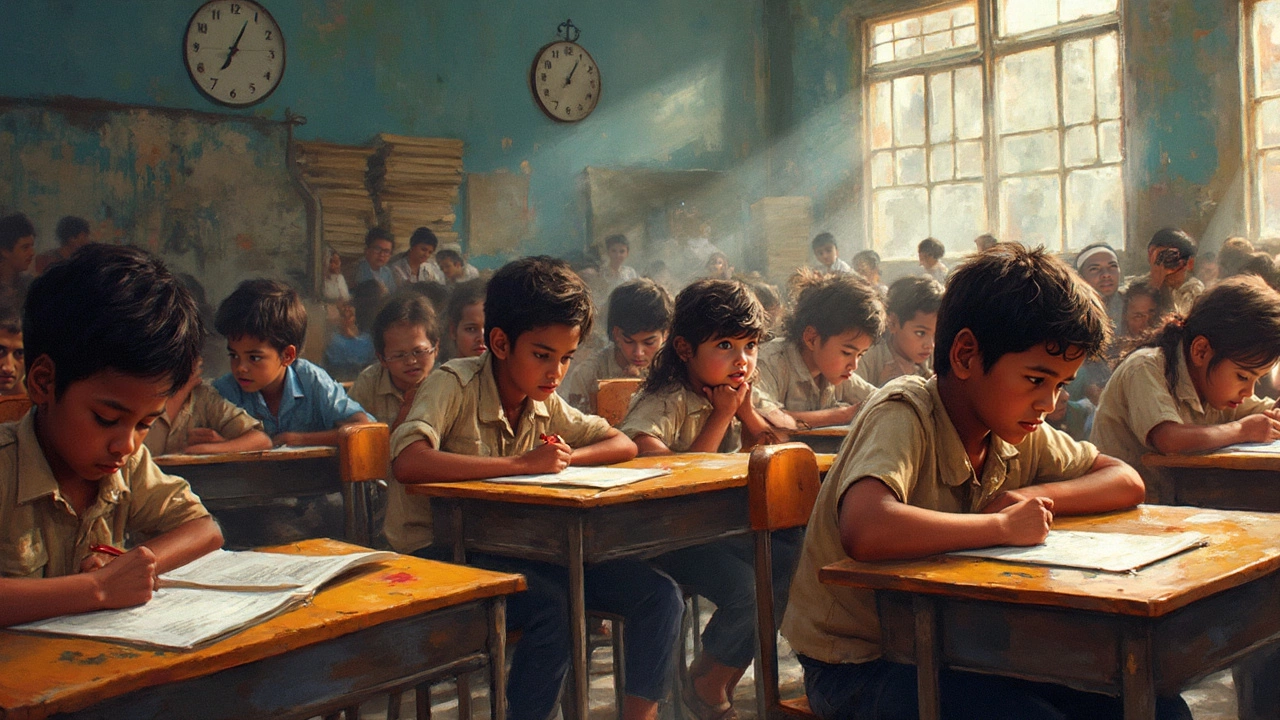“World’s hardest exam”—sounds dramatic, right? But millions of students and professionals deal with tests so tough, the pass rates can make your stomach drop. So what actually makes an exam deserve that title? Is it the endless hours of studying, the mind-trick questions, or just the fact nearly everyone fails?
Some of these legendary exams aren’t just about remembering facts. They’re designed to trip you up, stress you out, and reveal who can keep it together when the pressure gets real. A few, like the Indian UPSC Civil Services Exam or China's Gaokao, are so intense that entire industries—books, tutors, even wellness apps—exist just to help people get through them.
But here’s what’s wild: for each “hardest exam” out there, there are real strategies that help make that mountain just a little bit smaller. If you’re staring down the barrel of one, stick around to see what makes these tests so brutal and how people actually crack them.
- What Decides the Hardest Exam?
- World-Famous Brutal Exams
- Real Numbers: Pass Rates and Shockers
- Tips for Surviving Extreme Exams
What Decides the Hardest Exam?
When people talk about the hardest exam ever, they’re not just talking about long question papers. It’s a combo of different factors that ramp up the panic. First off, the length of the exam—some of these monsters last up to 9 hours in a single day. The Japanese National Bar Exam clocks in at three full days, and that's just the written part. Then, there’s the sheer size of material covered. For example, the USMLE Step 1 for doctors in America hits basically everything from the first two years of med school.
The number of people who actually pass these exams drops jaws. The success rate of the UPSC Civil Services Exam in India? Less than 0.2%. The infamous CFA Level 1 hovers under 40% globally. The French École Normale Supérieure entrance exam often means an acceptance rate below 5%.
Let’s break down what makes an exam brutal:
- Volume: The amount of stuff to remember can be ridiculous. Some Korean college entrance exams cover 8+ subjects, all in one sitting.
- Trickiness: It’s not just about memory. Many test your ability to apply, analyze, and problem-solve under crushing time pressure.
- Competition: High stakes mean thousands (sometimes millions) are fighting for a handful of spots.
- Mental endurance: Tests like the Chinese Gaokao and Japan’s entrance exams drain every bit of focus for hours.
- Consequences: For some, like the Gaokao, your whole future (college, job, life path) hangs on one result.
Check out this table showing how tough things can get:
| Exam Name | Duration | Pass Rate | Number of Test-takers (yearly) |
|---|---|---|---|
| UPSC Civil Services (India) | 1 year (multiple rounds) | 0.2% | 1 million+ |
| Gaokao (China) | 2 days | Varies, elite university cutoff <1% | 12 million+ |
| CFA Level 1 (Global) | 6 hours | 39% | 100,000+ |
| USMLE Step 1 (USA) | 8 hours | 96% (heavily pre-selected) | 20,000+ |
No matter where or what you’re testing for, if you’re dealing with a competitive exam like these, you’re up against more than just questions—you’re up against nerves, odds, and a system designed to find the tiniest edge. It’s not just about being smart. It’s about being strategic, too.
World-Famous Brutal Exams
When people talk about the hardest exam ever, a few tests always steal the spotlight. These aren’t just local legends—they’re global nightmares for students, career changers, and even families caught up in the frenzy. What sets them apart? Reality-check pass rates, years-long prep, and pressure that turns regular days into all-nighters.
The Indian UPSC Civil Services Exam is infamous for shaking up lives. Around 1 million people try it every year, but only about 1,000 make it through all the stages—prelims, mains, and interviews. That’s a 0.1% success rate. To pass, you need knowledge about everything from obscure world history to current politics, and you have to write essay after essay that really shows you can think on your feet.
China’s Gaokao exam is another beast. It decides who gets into the country’s top universities, and the entire education system is built around it. Some students start studying in elementary school just for this. Test days lock down entire cities, with streets cleared to avoid noise. Parents rent apartments near test centers for months, just to shave seconds off their kids’ morning commutes. Less than 0.2% hit the score for China’s most elite schools.
Then there’s Japan’s National Bar Exam—one of the lowest pass rates for law exams anywhere, hovering around 25%. Many test-takers spend years after law school cramming again, just for a shot at passing. South Korea’s Suneung exam decides college futures in a single shot, and Seoul literally grounds flights to keep the city quiet for test-takers.
In the U.S., the Medical College Admission Test (MCAT) and California Bar Exam are notorious too, but the CFA (Chartered Financial Analyst) exams may take the cake—only about 10% pass all three levels on the first try.
- Indian UPSC: 0.1% pass rate, three stages, essays, interviews
- Gaokao (China): Months to years of prep, < 0.2% to top schools
- Japan National Bar: about 25% make it through
- Korean Suneung: Whole country changes schedules
- CFA and California Bar: Years of retakes are normal
What these exams have in common isn’t just the material—they test how you handle marathon stress and pressure, not just smarts. If you ever feel like your exam is tough, just remember, there’s probably a student somewhere studying harder than you can even imagine.

Real Numbers: Pass Rates and Shockers
So, how tough are these tests really? Let’s talk numbers, because stats don’t lie. Some of the hardest competitive exams have pass rates lower than your phone battery after a full day on TikTok.
| Exam | Country | Typical Pass Rate |
|---|---|---|
| UPSC Civil Services | India | 0.2% - 0.3% |
| Gaokao | China | 2%* (for top-tier universities) |
| All Souls Prize Fellowship | UK | 1-2 scholars/year (out of hundreds) |
| USMLE Step 1 | USA | less than 75% (first-time takers) |
| Chartered Accountant (CA) Final | India | 8-10% |
*Gaokao is technically “passed” by most, but only a tiny slice get into China’s best universities—where the real competition is.
For the hardest exam in India, the UPSC, more than a million people sign up each year, and only about a thousand get through. To put that into perspective, you have better odds of getting into Ivy League colleges.
Why are pass rates so insane? Well, these tests often have multiple rounds, super-lengthy papers, and questions that force you to think outside textbooks. Plus, competition isn't just fierce—it's off the charts. For example, the Chartered Accountant exam in India is known for papers that most test-takers actually run out of time on. You need top-notch speed and critical thinking, not just good memories.
UPSC Topper Anudeep Durishetty told The Hindu: "Each stage tests a different set of abilities. It's not just about intelligence, it's about endurance."
Maybe you’re wondering how many shots people get at these exams. UPSC gives most people only six tries. Gaokao? Only once a year, and for many, just one shot ever. Imagine the pressure of knowing one bad day can close all doors.
- Tip: Always check the number of allowed attempts. Plan your years strategically, especially if the exam schedule is strict.
- Don’t just focus on the pass rate—read past toppers’ stories. They give you the real scoop on what it takes.
Tips for Surviving Extreme Exams
Getting ready for the hardest exam isn’t about being a genius—it’s about smart prep, grit, and having a real plan. Let’s talk about what really works when you’re going head-to-head with an exam people call “impossible.”
- Know the format inside out: Before you start studying, grab the official syllabus and check past years’ question papers. Top scorers from India’s UPSC exam or Japan’s National Bar Exam always talk about analyzing patterns, not just cramming facts.
- Practice, then practice some more: Mock tests change everything. A 2022 study from Peking University showed that Gaokao students who took weekly mock exams had way less anxiety and scored higher, especially under time pressure. Treat practice tests like the real thing—no phones, no breaks.
- Set a crazy-specific schedule: ‘Study hard’ isn’t enough. People who pass notoriously tough tests like the CFA or Korea’s Suneung usually study for months on detailed, daily plans. Focus on small, regular goals rather than random late-night marathons.
- Pace yourself: Extreme exams often last all day or even several days. Don’t skip sleep. Harvard research shows students memorizing after just five hours of sleep make way more mistakes than those who get seven or more.
- Hack your mental game: Build confidence, not just knowledge. Candidates who journaled their fears or talked about worst-case scenarios (literally out loud!) before the French ENA exam, did better in both mock and real sessions. It’s normal to be nervous, but don’t let it rule your brain.
- Don’t go it alone: Study groups aren’t always about swapping answers; they help fill in your knowledge gaps and give you different approaches to weird questions. Plus, seeing someone else solve a monster question is pretty motivating.
If you’re stuck, remember: every single person who ever cracked a brutal test started out feeling overwhelmed. These tips aren’t magic—they’re just how real people put in the work and made it stick.
